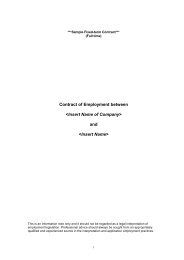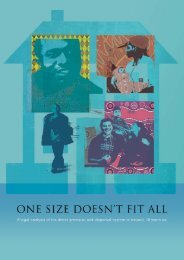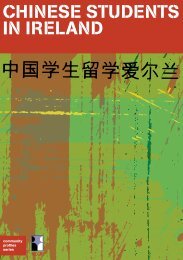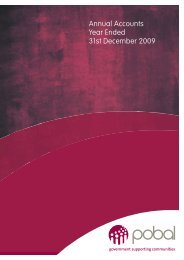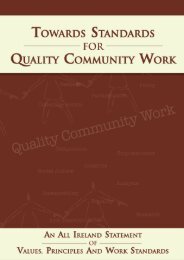Intercultural Education in the Post-Primary School - National Council ...
Intercultural Education in the Post-Primary School - National Council ...
Intercultural Education in the Post-Primary School - National Council ...
You also want an ePaper? Increase the reach of your titles
YUMPU automatically turns print PDFs into web optimized ePapers that Google loves.
7ASSESSMENT AND CULTURAL DIVERSITYAssessment is an essential element of <strong>the</strong> teach<strong>in</strong>g and learn<strong>in</strong>gprocess. Its purposes <strong>in</strong>clude foster<strong>in</strong>g learn<strong>in</strong>g, improv<strong>in</strong>g teach<strong>in</strong>gand provid<strong>in</strong>g <strong>in</strong>formation about what has been done or achieved.PURPOSES OF ASSESSMENTAssessment takes different forms and canbe used <strong>in</strong> a variety of ways, such as toprovide feedback to students on <strong>the</strong>irprogress, to test and certify achievement(e.g. Junior and Leav<strong>in</strong>g Certificate), todeterm<strong>in</strong>e <strong>the</strong> appropriate route forstudents to take through a differentiatedcurriculum or to identify specific areas ofdifficulty (or strength) for a given student.As with o<strong>the</strong>r elements of <strong>the</strong> teach<strong>in</strong>g andlearn<strong>in</strong>g process, assessment also plays akey role <strong>in</strong> <strong>the</strong> build<strong>in</strong>g of a relationshipbetween teacher and student. If <strong>the</strong>assessment process is positive <strong>the</strong>n studentsdevelop a sense that <strong>the</strong> teacher is<strong>in</strong>terested <strong>in</strong> <strong>the</strong>m and <strong>the</strong>y will beaffirmed and motivated through <strong>the</strong>process. Deal<strong>in</strong>g with assessment requiresboth <strong>the</strong> ability to build relationships thatmakes <strong>the</strong> assessment experience positiveand formative for students, and anunderstand<strong>in</strong>g of <strong>the</strong> purposes andmethods of assessment necessary to ensurethat accurate and useful conclusions can bedrawn to assist <strong>in</strong> future learn<strong>in</strong>g.<strong>Post</strong>-primary teachers are presented with<strong>the</strong> additional challenge of prepar<strong>in</strong>gstudents for formal state exam<strong>in</strong>ations.Students for whom <strong>the</strong> language of<strong>in</strong>struction and assessment is not <strong>the</strong>ir firstlanguage require considerable supportfrom <strong>the</strong>ir subject teachers and from <strong>the</strong>language support teacher <strong>in</strong> familiarisng<strong>the</strong>m with <strong>the</strong> various assessment methodsthat <strong>the</strong>y will encounter and <strong>the</strong>exam<strong>in</strong>ation vocabulary commonly used.While students may now use dictionaries <strong>in</strong><strong>the</strong> Junior and Leav<strong>in</strong>g CertificateExam<strong>in</strong>ations (S23/05, Use of Bil<strong>in</strong>gualDictionaries <strong>in</strong> <strong>the</strong> CertificateExam<strong>in</strong>ations), it is important that <strong>the</strong>y arefamiliar with <strong>the</strong> use of dictionaries <strong>in</strong> <strong>the</strong>irclasswork and school assessments.90<strong>Intercultural</strong> <strong>Education</strong> <strong>in</strong> <strong>the</strong> <strong>Post</strong> <strong>Primary</strong> <strong>School</strong>






